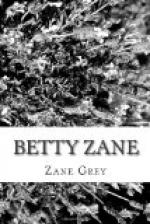“We are in for more trouble from the Wyandots and Shawnees. But, Bessie, I don’t believe it will come soon. We are too well protected here for anything but a protracted siege.”
Colonel Zane’s light and rather evasive answer did not deceive his wife. She knew her brother and her husband would not wear anxious faces for nothing. Her usually bright face clouded with a look of distress. She had seen enough of Indian warfare to make her shudder with horror at the mere thought. Betty seemed unconcerned. She sat down beside the dog and patted him on the head.
“Tige, Indians! Indians!” she said.
The dog growled and showed his teeth. It was only necessary to mention Indians to arouse his ire.
“The dog has been uneasy of late,” continued Colonel Zane “He found the Indian tracks before Wetzel did. You know how Tige hates Indians. Ever since he came home with Isaac four years ago he has been of great service to the scouts, as he possesses so much intelligence and sagacity. Tige followed Isaac home the last time he escaped from the Wyandots. When Isaac was in captivity he nursed and cared for the dog after he had been brutally beaten by the redskins. Have you ever heard that long mournful howl Tige gives out sometimes in the dead of night?”
“Yes I have, and it makes me cover up my head,” said Betty.
“Well, it is Tige mourning for Isaac,” said Colonel Zane
“Poor Isaac,” murmured Betty.
“Do you remember him? It has been nine years since you saw him,” said Mrs. Zane.
“Remember Isaac? Indeed I do. I shall never forget him. I wonder if he is still living?”
“Probably not. It is now four years since he was recaptured. I think it would have been impossible to keep him that length of time, unless, of course, he has married that Indian girl. The simplicity of the Indian nature is remarkable. He could easily have deceived them and made them believe he was content in captivity. Probably, in attempting to escape again, he has been killed as was poor Andrew.”
Brother and sister gazed with dark, sad eyes into the fire, now burned down to a glowing bed of coals. The silence remained unbroken save for the moan of the rising wind outside, the rattle of hail, and the patter of rain drops on the roof.
CHAPTER II.
Fort Henry stood on a bluff overlooking the river and commanded a fine view of the surrounding country. In shape it was a parallelogram, being about three hundred and fifty-six feet in length, and one hundred and fifty in width. Surrounded by a stockade fence twelve feet high, with a yard wide walk running around the inside, and with bastions at each corner large enough to contain six defenders, the fort presented an almost impregnable defense. The blockhouse was two stories in height, the second story projecting out several feet over the first. The thick white oak walls bristled with portholes. Besides the blockhouse, there were a number of cabins located within the stockade. Wells had been sunk inside the inclosure, so that if the spring happened to go dry, an abundance of good water could be had at all times.




